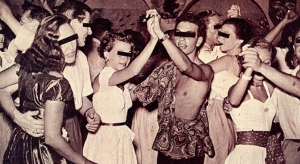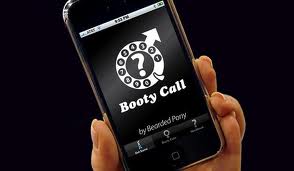She receives an all too familiar text Friday night reading, “Hey. What are you up to later?” She reads it and ignores it for thirty minutes to come off aloof to him, the guy she’s been hooking up with for four months. All of her weekend “non-dates” have had the elegance and charmlessness of a keg stand…but hey, at least she doesn’t have to deal with the emotional entanglement of a relationship being a twenty-six year old young professional in pursuit of becoming successful in a high paying career.Her story is all too familiar in the casual, unattached and promiscuous culture that defines dating culture amongst Millennials.
Photo from Judgy Bitch article
Maybe you thought the ambiguous cloud known as “hookup culture” that has dominated your life in the past few years as a college student, and has you constantly checking your phone on weekend nights, was just a college thing. Due to busy schedules, a focus on a successful career and unwillingness to commit the time and energy to build a serious relationship has caused Millennials to abandon traditional dating and embrace hooking culture even past its college roots. Hookup culture, casual sex with strangers and friends-with-benefits arrangements have replaced the long-term romantic relationships previous generations have embodied.
How do Millennials define courtship? Picking up the telephone and asking someone on a date? Forgoing that 140 cryptic tweet and asking someone on a date in broad daylight? The focus on becoming successful in a high paying career or asynchronous technological communication such as texting has further perpetuated the upending of dating culture. But securing “plans” for the night has become as easy as sending a text reading “Sup?” and older generations simply do not get it. The Boston Globe has created a matchmaker service named Dinner with Cupid to promote traditional courtship amongst Millennials. That is, going on a date face to face and getting to know each other through conversation, even reimbursing date dinners for up to $100. 
Photo from Jon Mertitt On Faith and Culture article
As I took the Millennial Quiz by Pew Research during my layover in Philly, I was sure I would receive a high score. I was raised by multi-racial and multi-cultural parents, enjoy body art and although I live by Buddhist mantras, don’t identify myself in religious terms. To my surprise, I scored a 59 on this quiz which left me a bit quizzical as to if the quiz included enough personality and value metrics to accurately gage how Millennial I truly am. Sure, I hate online shopping, sipping on Starbucks coffees and find twitter irrelevant, but I began to question what cultural value of Millennials I not identify with. Then finally it hit me like a ton of bricks as I texted my boyfriend what time to pick me up from the airport.
Maybe hooking up and going separate ways is truly Millennials’ cup of tea, but will this change in the next few decades as we mature as a generation? Will the Millennials’ continue to enjoy casual hookups into our golden years or will there be a renaissance to the lost art of dating?



It will be an interesting thing to see what the hookup culture does to marriage trends. Do you think it will make the average marrying age increase? Will it stay about the same and divorce rates will simply increase?
LikeLiked by 1 person
I think the shift of Generation X’s ideal “life success” as having values that lie within success in the workplace as well as having a family to come home to, to the Millennials ideal “life success” being primarily focused on success and career has been an attribute to the average marrying age increasing and overall marriage rate decreasing. I always find myself in conversations with friends about how our generation’s marriage rate is going to be ridiculously low but I never looked into how low it really is. According to the Pew Center (http://www.pewsocialtrends.org/2010/11/18/the-decline-of-marriage-and-rise-of-new-families/), in 2012, 26% of 20 somethings were married, which is way lower than what I thought it currently was. I’m scared/curious if this will decrease further in upcoming years. This is vastly different from 1960, where 68% of 20 somethings were married. But also we should consider the human geography metrics (access to education for females, % of females in the workplace, ect.) since they have changed the role of women in society and have accelerated this shift in cultural values for Millennials.
Maybe this means the statistic of 50% of marriages end up in divorces will decrease because people are less likely to rush into marriages?
LikeLiked by 1 person
The culture of hookups have become more open and less censored because of how people view marriage. it was a time where courtship meant something and waiting until you were married was voiced very strongly. When did that change?
Hook ups have been something that has always been in the back drop off our lives. It wasn’t something that you would hear openly talked about.
Last Fall in a women and genders class, I was amazed at several of the girls that would boast about the guys they hooked up with after a party. These conversations took place every class session. People should be free to explore but at what cost. The value of marriage has changed but I do not think that hook ups are the cause of it.
I have the same questions as Cate about marriage trends. How will this affect the generations to come?
LikeLike
Stable relationships have measurable benefits economically, emotionally, and socially. So, I can imagine lingering issues like more loneliness, poverty, depression, and such caused by an overall decline in healthy, stable relationships.
LikeLike
Is the hook-up culture an extension of feminism and women’s changing roles? Without seeming too sexist, I hope, if you said to the “typical” male that dating and courtship were gone and sexual experiences were as attachment-free as one wanted, then that typical male would jump for joy.
If women, in a more patriarchal recent past of America, were socialized to think that they were supposed to be relationship-centric and on the look-out for long-term partners and spouses, then does embracing hook-up culture mean they are more similar to the boys and men?
Is hook-up culture simply women behaving more like men and dropping previous culturally-defined roles?
LikeLike
Fun read. As college students, I would agree that the hook up culture is definitely significant. However, born in Guatemala I still keep in touch with my friends down there who are now in college. They go to parties similarly and drink, but the hook up culture does not exist. Guys and girl actually seek dates and surprisingly try to avoid an American like hook up culture. Why do you think this is? Different country, different values?
LikeLike